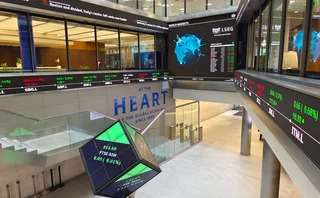
Currencies flow market-maker of the year: Citadel Securities
Risk Awards 2019: Credit innovation opens up market-making to previously out-of-reach customers

On the surface, the foreign exchange market is tailor-made for non-bank liquidity providers. Spot, in particular, is highly electronic with an abundance of market data – perfect conditions for nimble market-makers.
But there is one aspect that limits their expansion – credit. To make markets in forex, non-banks rely on prime brokerage arrangements with the largest dealers on the Street in order to trade on their credit and, with those arrangements, supply liquidity to firms that also use a prime broker.
That typically means non-banks such as Citadel Securities are restricted to making markets to banks and buy-side firms that use such a credit arrangement to trade in the forex market. However, the Chicago-based firm has managed to come up with an innovative way of expanding its reach to smaller, regional banks that do not use a prime broker.
“The way it works is we’ve tapped into the existing credit line that one of our bank partners has with some regional banks, which results in a certain percentage of that credit line being reserved to trade exclusively with Citadel Securities,” says Kevin Kimmel, global head of e-FX at Citadel Securities.
“Once arranged, we will then show a Citadel Securities price stream to the regional bank client. When that client executes a trade with us, it’s going to look exactly the same as if they had executed the trade with our bank credit partner instead. From a post-trade perspective, nothing has changed.”
Citadel has managed to strike one such relationship with a London-based international bank in 2018 which it pays for on a per trade basis, and has another one in the works. The broker-dealer has set up similar arrangements with other credit partners to gain access to retail and institutional brokerages that also do not use a prime broker, with an additional agreement set to start in the next couple of months. These agreements account for more than 15% of client volume at the firm.
“For the bank, there’s a monetary advantage in terms of being able to charge a firm like us to rent some of that spare credit line, but they are also enabling institutional clients to access more liquidity,” says Kimmel.
As forex is still largely a bilateral credit market, Citadel has been forced to come up with solutions to tap into new client sets. To date, clearing has been limited largely to interbank non-deliverable forward trades.
“It’s a good temporary solution, but central clearing would be the panacea for us,” says Kimmel.
Risk partnerships
In parallel, the broker-dealer has also struck up what it calls ‘exclusive risk partnerships’ in which it becomes the sole liquidity provider to a bank in certain currency pairs. In this scenario, Citadel Securities’ liquidity is white-labelled – the bank’s end-clients are not aware the firm is the ultimate market-maker.
“In our partnership arrangements, the bank will do an external forex trade and then give us that position, so we essentially become a risk warehousing outlet for them,” says Kimmel. “We are then able to show a more competitive price in a specific currency pair versus what they might be able to generate themselves.”
That begs the question, why does Citadel not brush past the bank and speak directly to the client instead? The credit barrier is one obstacle; the other is Citadel’s own understanding of its place in the world, says Kimmel.
“The banks have a much more holistic service, whereas we’re good at a few things, which includes providing a principal price and warehousing that risk. So to the extent that the banks’ entire offering could be augmented by just a more competitive principal price, then that’s where we plug in,” he says.
Like the credit piggybacking game, the white-label liquidity partnerships are also new for Citadel Securities this year. It has helped push the firm’s client market-making volumes up 50% year-on-year as of October, and has now traded with roughly 200 counterparties in forex to-date. Citadel is also now a top five liquidity provider on most major currencies platforms.
Although the risk partnerships are limited in scope, Kimmel puts that down to there being more work involved in striking up an exclusive partnership versus streaming liquidity into a bank’s internal aggregator along with other market-makers.
“We’ve built very customisable technology down to the individual client level, which allows us to price each client with a degree of freedom. That can be a bit different from some other liquidity providers who might move clients across generic streams,” he says.
Only users who have a paid subscription or are part of a corporate subscription are able to print or copy content.
To access these options, along with all other subscription benefits, please contact info@risk.net or view our subscription options here: http://subscriptions.risk.net/subscribe
You are currently unable to print this content. Please contact info@risk.net to find out more.
You are currently unable to copy this content. Please contact info@risk.net to find out more.
Copyright Infopro Digital Limited. All rights reserved.
As outlined in our terms and conditions, https://www.infopro-digital.com/terms-and-conditions/subscriptions/ (point 2.4), printing is limited to a single copy.
If you would like to purchase additional rights please email info@risk.net
Copyright Infopro Digital Limited. All rights reserved.
You may share this content using our article tools. As outlined in our terms and conditions, https://www.infopro-digital.com/terms-and-conditions/subscriptions/ (clause 2.4), an Authorised User may only make one copy of the materials for their own personal use. You must also comply with the restrictions in clause 2.5.
If you would like to purchase additional rights please email info@risk.net
More on Awards
Clearing house of the year: LCH
Risk Awards 2025: LCH outshines rivals in its commitment to innovation and co-operation with clearing members
Best use of machine learning/AI: CompatibL
CompatibL’s groundbreaking use of LLMs for automated trade entry earned the Best use of machine learning/AI award at the 2025 Risk Markets Technology Awards, redefining speed and reliability in what-if analytics
Markets Technology Awards 2025 winners’ review
Vendors jockeying for position in this year’s MTAs, as banks and regulators take aim at counterparty blind spots
Equity derivatives house of the year: Bank of America
Risk Awards 2025: Bank gains plaudits – and profits – with enhanced product range, including new variants of short-vol structures and equity dispersion
Law firm of the year: Linklaters
Risk Awards 2025: Law firm’s work helped buttress markets for credit derivatives, clearing and digital assets
Derivatives house of the year: UBS
Risk Awards 2025: Mega-merger expected to add $1 billion to markets revenues, via 30 integration projects
Interest rate derivatives house of the year: JP Morgan
Risk Awards 2025: Steepener hedges and Spire novations helped clients navigate shifting rates regime
Currency derivatives house of the year: UBS
Risk Awards 2025: Access to wealth management client base helped Swiss bank to recycle volatility and provide accurate pricing for a range of FX structures







